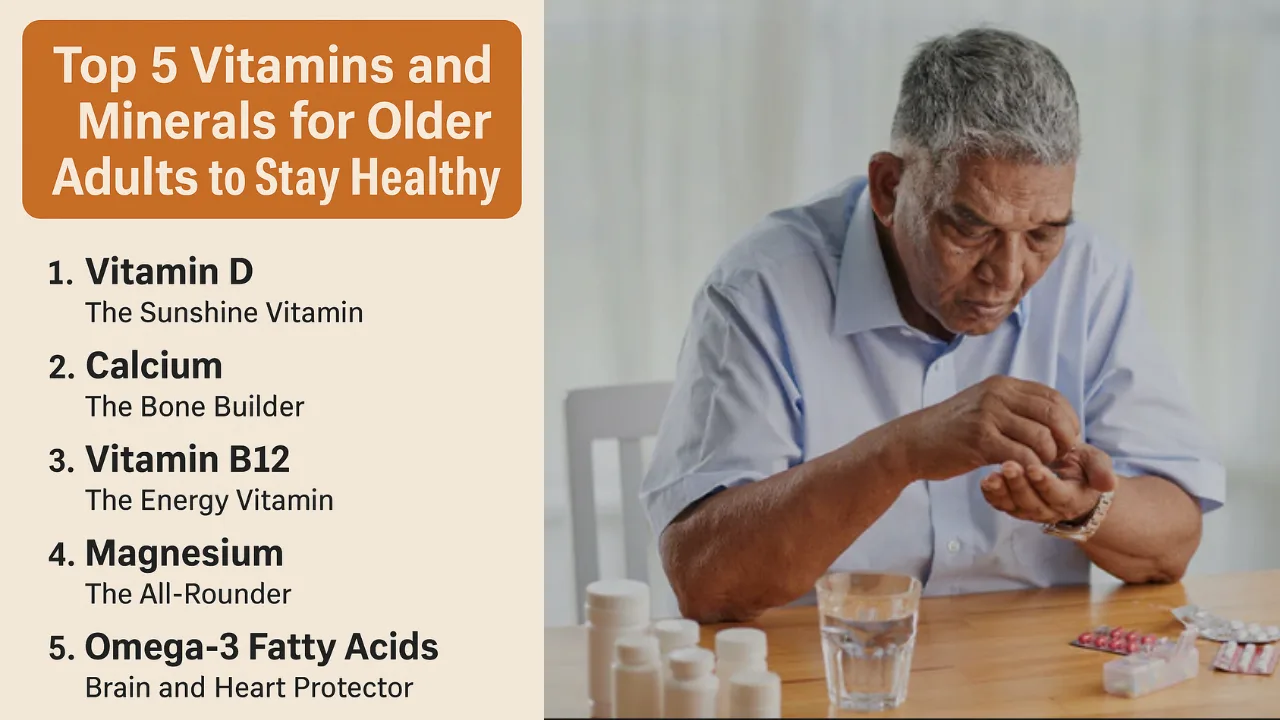before talking about top 5 vitamins and mineralsWe all know that as we come into older adults age, our body has changed with some natural changes that can affect our body. This also depends on how effectively our body absorbs and utilizes nutrients in everyday life.
Whenever you come into older adulthood you need to require many more higher amounts of minerals and vitamins to maintain your energy level, your strength, immunity and overall well being.
While a balanced diet is one of the best ways to get good health,the best nutrients or sometimes medication also make your supplements necessary. If you are the person who wants to improve your quality of life then you always need to focus on Right vitamins and minerals, because it can help you to reduce risk of chronic disease, brain health and support bone.
CNET identifies the top 5 nutrients(vitamins and minerals) to help with healthy aging, as recommended by experts.
- Magnesium
Magnesium is a key player in over 300 biochemical processes in the body. It helps support proper muscle and nerve function, regulates blood sugar levels, and promotes overall heart health. Unfortunately, magnesium levels tend to decline with aging, often due to any number of processed dietary and lifestyle choices, as well as medications such as diuretics and antacids.
Older adults can source magnesium through foods such as dark chocolate, nuts, leafy greens, seeds and whole grains. Supplements may be required if diet offers inadequate elevation level, and too much magnesium can cause digestive issues and therefore must be dosed appropriately.
- Vitamin B (B12, Folate)
vitamins B that are utilitarian in energy metabolism, nerve health, and red blood cell function.
Vitamin B12 is a concern as older adults will have impaired absorption due to lower stomach acid levels. Folate can aid in leg health while also preventing cognitive decline and supporting brain health.
B12 is primarily in food sources from animals (meat, eggs, and dairy), while folates can be found in fortified cereals, legumes and leafy green vegetables. An individual can feel fatigue and struggle with balance and memory, one can have a higher potential of heart disease, and therefore can improve quality of life by taking a supplement when levels are low.
- Calcium
Calcium is critically important for the maintenance of healthy bones and healthy teeth. Bone density decreases with increasing age; while it decreases in older men as well, bone density decreases more dramatically in post-menopausal women. This increased bone density means that older adults have an increased chance of fractures and osteoporosis.
There are many different sources of calcium, and calcium found naturally in food is the most bioavailable form. Dairy foods such as milk, yogurt, and cheese contain a significant amount of calcium. Other sources of calcium include a foundation of green leafy vegetables such as kale, nuts such as almonds, and tofu which is also typically fortified with calcium.
Other sources, like amaranth and dried figs, may also serve as alternative sources of calcium, and there are also herbal calcium teas with horsetail, nettle, and alfalfa.For adults over the age of 50, the recommended daily intake is around 1200 mg. If a diet is lacking in calcium, individuals can also take calcium supplements. Care must be taken to not consume too much calcium, as excessive calcium can lead to kidney stones, create complications with other minerals, and consequently lead to a deficiency of other minerals.
- Vitamin D
Vitamin D aids in calcium absorption and plays a vital role in supporting the immune system and muscle function. Because older adults tend to be less active and spend less time in the sun or are not able to synthesize vitamin D through their skin, Vitamin D can become deficient.
Vitamin D can be obtained through exposure to the sun, fatty fish (salmon, mackerel), and fortified foods. There are also other natural vitamins and supplements like cod liver oil, and perhaps combining the vitamin with herbs like reishi mushrooms for immune support. Many practitioners recommend supplementation, especially in colder climates or in patients and individuals with an increased risk of bone density loss, autoimmune conditions, and frequent infections.
- Omega-3 Fatty Acids
Omega-3 fatty acids are essential nutrients that support both heart health and brain function. Omega-3s can combat inflammation and may reduce cardiovascular risk and potentially reduce the likelihood of cognitive decline including Alzheimer’s.
Excellent dietary sources of omega-3 fatty acids include fatty fish such as salmon, sardines, and mackerel. Spinach, flaxseeds, and chia seeds are all sources of non-fish omega-3s. However, these sources are a different type of omega-3 and may not be utilized as efficiently by the body. Omega-3 supplements such as fish oil or algae oil are great options for people who do not eat fish regularly.
Good nutrition along with a good supplement program when necessary can keep older adults engaged and able to live independently. It is best to check with a healthcare provider prior to adding any supplements to determine if they are necessary and to ascertain potential drug interactions. Making healthy nutrition choices today lays the foundation for a healthier, more energetic, and vibrant tomorrow.
Also Read: Shocking Study Reveals Popular Gabapentin Painkiller May Boost Dementia Risk by 40%









I take vitamin B complex https://www.amazon.com/B-Complex-Pantothenic-Methylcobalamin-Pyridoxine-Niacinamide/dp/B0CKT5PGPN, and sometimes magnesium glycinate for better sleep. And I think I should also add vitamins C and D to my daily supplement after reading your article, thank you for this important information.